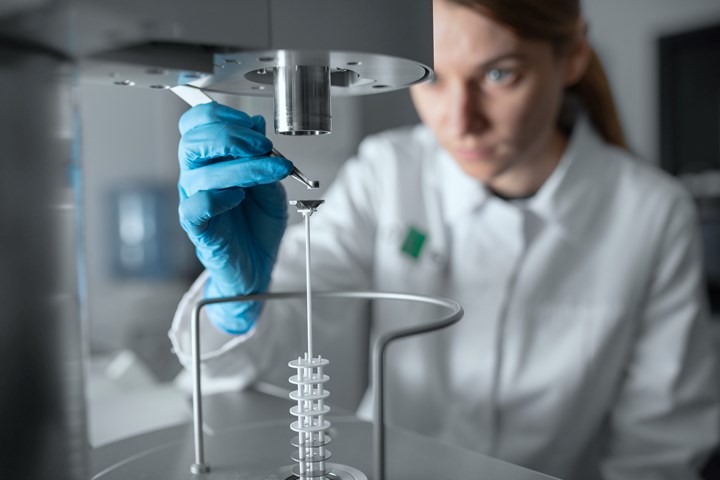Graphene Nanotube Concentrate Allows Automakers to Boost Efficiency
OCSiAl’s Tuball Matrix 822 concentrate is designed for nylons, filled PPS, ABS, PC, and TPU.
A new graphene nanotube concentrate, which reportedly provides targeted conductivity to injection molded ABS, PC, filled PPS, and TPU automotive components at working loadings starting from 0.1 wt.% of nanotubes in the final system has been launched by (U.S. office in Columbus, Oh.), the world’s largest manufacturer of single-wall carbon/graphene nanotubes. This approach reportedly allows automakers to optimize the painting process and reduce the final production cost.

Introducing these nanotubes creates a permanent and homogeneous electrical conductivity without “hot spots” in the range of 10^5–10^9 Ω·cm, while retaining the original key mechanical properties, such as durability and strength, and minimally impacting the host polymer matrix. Furthermore, a low working dosage of 0.1-0.3 wt.% of graphene nanotubes demonstrates only a limited effect on rheological properties and processability.
According to the company, graphene nanotube concentrate now enables in-line e-painting of plastic exterior parts together with metal components using electrophoresis, where previously, separate production lines were required. As plastics are insulative, painting of exterior automotive parts, such as fenders, bumpers, tanks flaps, grilles, mirror housing, exterior trims, and rear quarter panels, is complicated by the necessity of separate operation lines for metallic and polymer components, which makes in-line electrostatic spray painting impossible. This leads to additional expenses and slows down the whole painting process. As such, manufacturers of automotive parts need to opt for temperature-stable thermoplastic grades and modify these systems with electrically conductive additives. The most widespread is carbon black. However, because of their high working dosage required, car end parts with additives demonstrate worsened mechanical properties and processing challenges.
Said Vladimir Kravchenko, OCSiAl’s development and support leader for thermosets, “The new product will also be valuable for improving automotive safety and tracking systems: graphene nanotubes allow makers to produce high-quality electrically conductive thermoplastic products without compromises in terms of overall product mechanical performance or durability. We already see demand from manufacturers of fuel system parts including quick connectors, fuel pumps, valves, filter housings, EV-battery caps, and other car components.”
Related Content
-
Prices Up for PE, ABS, PC, Nylons 6 and 66; Down for PP, PET and Flat for PS and PVC
Second quarter started with price hikes in PE and the four volume engineering resins, but relatively stable pricing was largely expected by the quarter’s end.
-
Prices for All Volume Resins Head Down at End of 2023
Flat-to-downward trajectory for at least this month.
-
Prices for PE, PS, PVC, PET Trending Flat; PP to Drop
Despite price increase nominations going into second quarter, it appeared there was potential for generally flat pricing with the exception of a major downward correction for PP.


